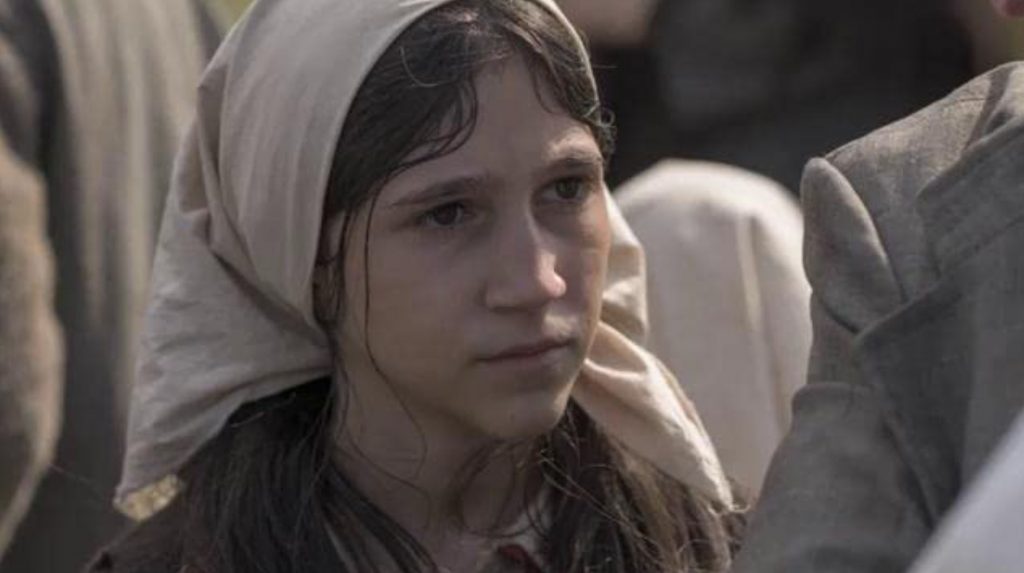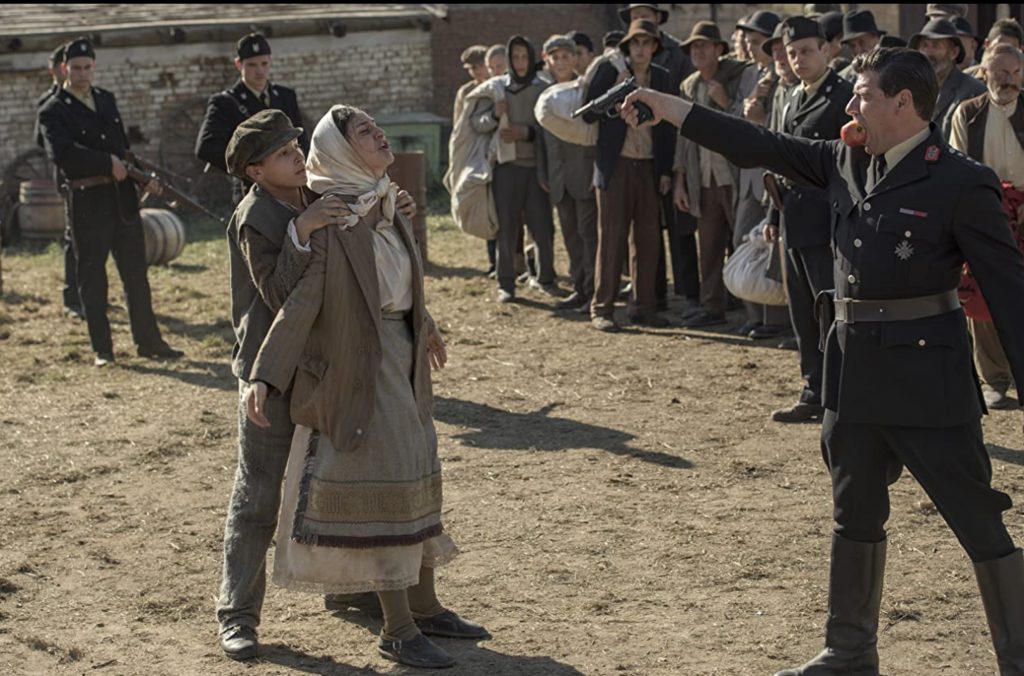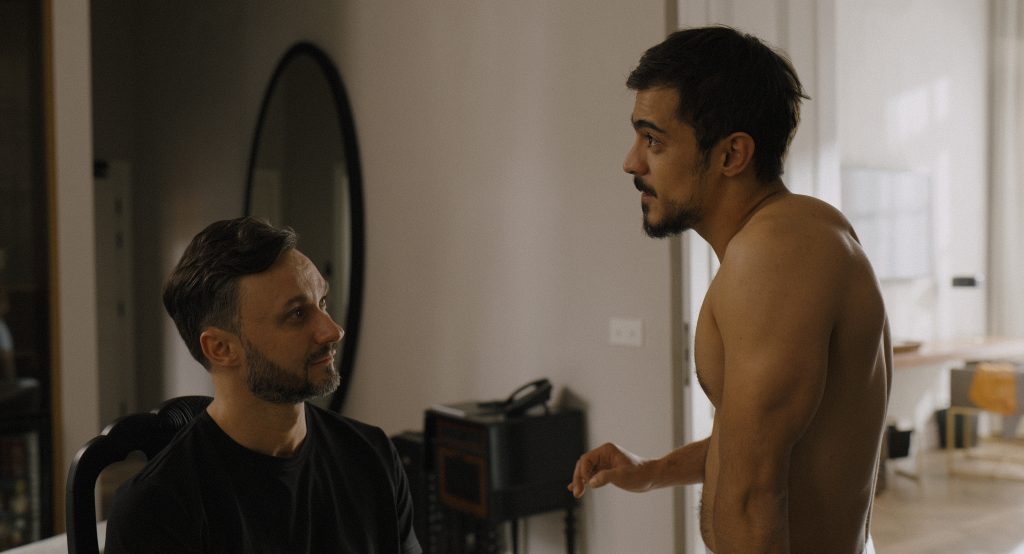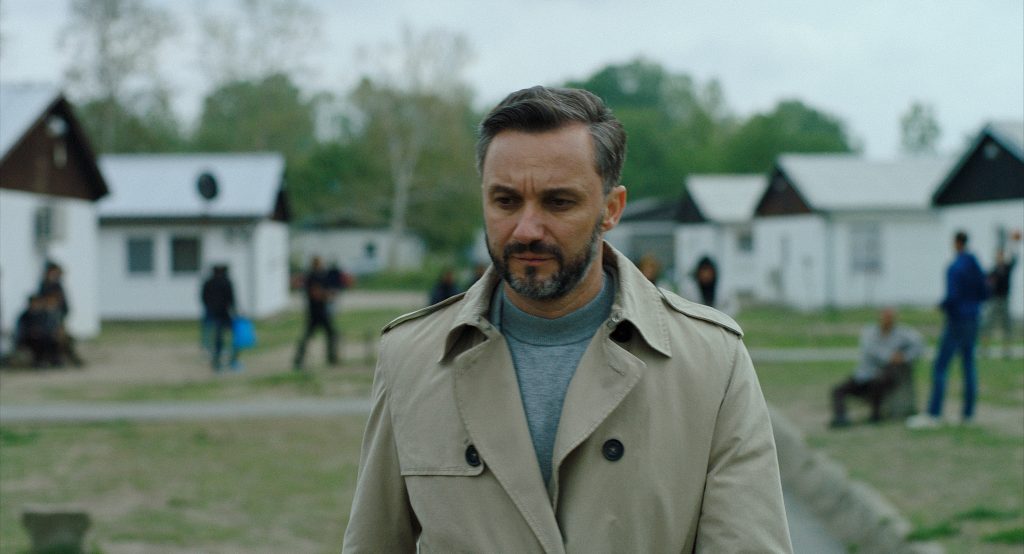February 14, 2021
by Carla Hay

Directed by Predrag Antonijević
Serbian and Croatian with subtitles
Culture Representation: Taking place Croatia during World War II, the dramatic film “Dara of Jasenovac” features an all-white cast of characters portraying concentration camp prisoners and their oppressors.
Culture Clash: Ethnic Serbs, Jews and Roma people were imprisoned, tortured and killed by Croatians who were sympathetic to Nazi beliefs.
Culture Audience: “Dara of Jasenovac” will appeal primarily to people interested in a dramatic portrayal about the dark side of Croatian history, and viewers should expect to see many depressing and violent scenes.

Just say the words “concentration camp movie,” and you can figure out what’s in the film, so sensitive viewers should be warned. The dramatic film “Dara of Jasenovac” is well-acted and thoughtfully constructed, but the movie’s disturbing onslaught of violence (including heartbreaking depictions of children being murdered) will make this film very difficult to watch for many people. The movie has fictional characters but is inspired by real-life experiences of ethnic Serbs, Jews and Roma people who were imprisoned in Croatian concentration camps built by Croatia’s then-fascist Ustase government during the 1940s/World War II era. The most notorious Croatian concentration camp was called Jasenovac.
Directed by Predrag Antonijević and written by Natasa Drakulić, “Dara of Jasenovac” tells the story of a 10-year-old Serbian girl named Dara Ilić (played by Biljana Čekić) and her family’s tortuous saga of being separated and imprisoned in concentration camps in Croatia. Her father Mile Ilić (played by Zlatan Vidović) has been sent to the Donja Gradina Concentration Camp. A few kilometers away at Jasenovac are the rest of his immediate family: Dara, who is very introverted; her 12-year-old brother Jovo (played by Marko Pipić); her 1-year-old brother Budo, nicknamed Bude (played by triplets Luka, Jakov and Simon Saranović); and their mother Nada (played by Anja Stanić Ilić), who faces constant threats to have any or all of her children taken away from her.
Most of the movie depicts the violence, starvation and other traumas that this family and other people experience in the concentration camps. Although the movie has Dara’s name in the title, the story is often seen from the perspective of the adult prisoners. Dara endures immense tragedies, but she’s probably one of the most stoic characters you’ll ever see in a concentration camp movie, because she rarely cries or screams in terror, even when certain people she’s close to are murdered in front of her.
The torturers and murderers in this story are men and women who share in the Nazi belief of exterminating those who are not Christian or those who are considered ethnically “inferior.” Their leader in this story is Vjekoslav “Maks” Luburić (played by Marko Janketić), who is feared the most by the prisoners. His underlings, who are also very cruel and sadistic, include his second-in-command Ljabo Miloš (played by Bogdan Bogdanović) and Maks’ sister Nada Sakić (played by Alisa Radaković). And the movie doesn’t gloss over factual history that some nuns and other members of the clergy were complicit in helping people who operated concentration camps.
Mile befriends another prisoner named Jaša (played by Bojan ZiroviIlić), whose wife, four sons and one daughter were all murdered when they stayed behind in Sarajevo. As prisoners on work duty, Mile and Jaša are often tasked with dumping bodies of concentration camp victims in ditches or throwing murdered corpses into a river. It results in some harrowing scenes that further intensify the atrocities of what people witnessed in real life.
Meanwhile, Mile’s wife Nada has no idea where he is and asks another Jasenovac prisoner named Anđelko (played by Marko Pavlovski) if he’s seen her husband. Anđelko tells her that Mile is probably at Grandina, where many of the men have been sent to separate them from their families. Nada and her children soon find out that trying to reunite with Mile has to wait when they’re all just trying to survive and not be separated themselves. There are several times in the story when all five of the Ilić family members face the possibility of being torn apart from each other for various reasons.
At Jasenovac, there are three female prisoners who make a big difference in helping Dara and her family overcome some obstacles. One of them is compassionate Vera Stanić (played by Sandra Ljubojević), who steps up in a pivotal moment and pretends to be Mile’s sister, so that the Ilić family won’t be separated. There’s also feisty Mileva Kovar (played by Nikolina Friganović), who is severely beaten for stealing corn for her children. And a kind Jewish woman named Blankica (played by Jelena Grujićić) is especially fond of Dara and gives her helpful tips on survival.
The many gruesome murder scenes in the film include a vile game of musical chairs that the soldiers force the male prisoners to play. The odd man out gets his throat slit and stabbed. And sometimes a prisoner will have his throat cut for random reasons. The scene ends with the soldiers beating the prisoners to death.
This movie is relentless in showing people getting shot, beaten, stabbed and murdered in other horrific ways. And there’s no sugarcoating of the violence that happens to the children. There’s even a scene of kids who are locked in a room while a soldier throws a grenade inside to kill them. This is a movie that shows the worst of humanity, made all the more horrifying because it re-enacts what happened in real life.
Every time a significant character dies in the movie, “Dara of Jasanovec” has a technique of depicting how that person has passed into the afterlife, by showing the character walking through a snowstorm and stepping into a gloomy train car. As the story goes on, the train car gets filled up with more and more people, while more snow starts to fall. The snow is a metaphor for the worsening storm of this sickening Holocaust.
“Dara of Jasenovac” gets all of the production elements right in accurately portraying the hell of concentration camps. The actors all give convincing performances. However, the character of Dara is a bit of an enigma throughout the entire story. Viewers do not get any sense of what her hopes and dreams were before this terrible tragedy. She’s brave but very quiet, and she often barely reacts when a lot of terrible things are happening around her. But it’s also a realistic portrayal of how someone can be when they’re in shock.
It isn’t until the last third of the film, when Dara is faced with being permanently separated from her younger brother Budo, that Dara shows a fiery will to fight for her family. However, viewers should not expect to see a cliché ending where the people who survive live happily ever after. “Dara of Jasenovac” is a haunting and impactful story of how the evils of concentration camps have left permanent damage to countless families and are a shameful part of human history.
101 Studios released “Dara of Jasenovac” in select U.S. cinemas on February 5, 2021. The movie was released in Serbia in 2020.


